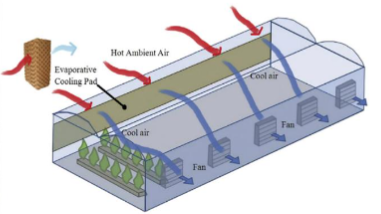Adaptive-Historical Energy-Efficient Temperature Control for Tropical Greenhouses
Abstract
Maintaining an optimal microclimate is essential for efficient operation of tropical greenhouses, particularly under fluctuating weather conditions. This study proposes an adaptive energy-efficient model for regulating air temperature in tropical greenhouses using historical climate data. The model optimizes the fan rotation speeds via an inverter to meet the temperature targets while minimizing energy consumption. Key methodologies include climate data analysis, development of a predictive model for indoor air temperature using Artificial Neural Networks, and optimization of fan speed control. The model achieved high predictive accuracy, with an RMSE of 0,02 and an R² of 0,96. The practical implementation demonstrated effective temperature control, with fan speeds ranging between 30 and 40 Hz during cloudy periods and 50 Hz in sunny conditions. Notably, the system reduced electricity consumption by 33,93% during cloudy weather and 18,54% in sunny weather, showing its potential for significant energy savings. This data-driven adaptive model approach is highly suited for tropical greenhouses experiencing dynamic climatic variations and offers a sustainable and efficient solution for greenhouse microclimate management.
Authors

This work is licensed under a Creative Commons Attribution-ShareAlike 4.0 International License.
Authors submitting manuscripts should understand and agree that copyright of manuscripts of the article shall be assigned/transferred to Jurnal Keteknikan Pertanian. This work is licensed under a Creative Commons Attribution-ShareAlike 4.0 International License (CC BY-SA) where Authors and Readers can copy and redistribute the material in any medium or format, as well as remix, transform, and build upon the material for any purpose, but they must give appropriate credit (cite to the article or content), provide a link to the license, and indicate if changes were made. If you remix, transform, or build upon the material, you must distribute your contributions under the same license as the original.

